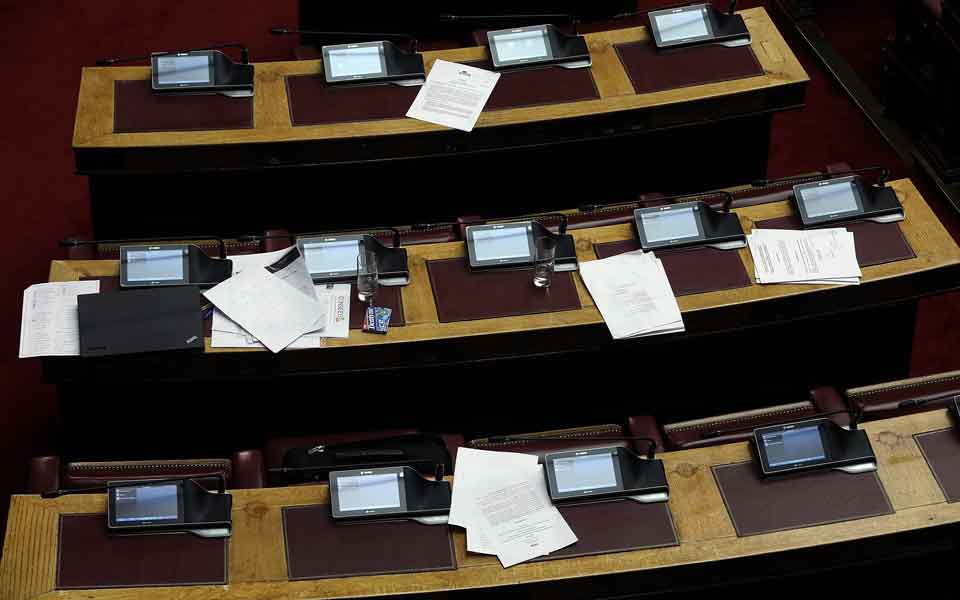From the multi-bill to the last few steps

Lawmakers will have to vote on Monday on the extensive multi-bill tabled last week by the government as Greece takes another step toward completing its third program. It is another unsatisfying moment for the country’s parliamentary democracy as hundreds of pages of draft legislation had to be debated over just a few days and there are legitimate doubts about whether deputies will fully comprehend what they are voting for.
However, as has been the case in previous years, the end seems to justify the means. Along with some ministerial decisions that are due to be issued, Monday’s vote should lead to the conclusion of the third review. Passing this milestone will help provide a clearer picture of what lies ahead before the bailout’s scheduled conclusion in August.
The omnibus bill contains 400 articles that pave the way for the creation of a new, 135-employee-strong agency to tackle major financial crime (including tax evasion), the licensing of casinos, incentives for businesses to start up in the center of Athens and the forming of a committee to re-examine the professions defined as hazardous and unhealthy.
Most attention, however, has been attracted by the articles relating to electronic auctions and strikes. The draft legislation stipulates that as of May 1 electronic auctions, which were only launched in November, will be the only form of foreclosure. The aim is to put an end to the weekly, sometimes ugly, standoffs at courts each week, when activists attempt to prevent auctions from taking place.
Regarding strikes, the would-be law decrees that for a first-level union to call protest action, at least half of the paid-up members have to vote in a general assembly. At the moment, just a third of members are required to do so.
These two measures have put the government in an uncomfortable position. One SYRIZA deputy, Yiannis Theonas, suggested last week that the article on strikes should not be adopted at all.
Speaking to the parliamentary committees assessing the multi-bill last week, Finance Minister Euclid Tsakalotos said the government did not agree with the change to the strike rules but had been unable to convince the creditors not to proceed with it. The coalition has highlighted, though, that the measure does not affect regional and national unions.
There is also some unease in the government ranks over the greater use of electronic auctions, especially as the Independent Authority for Public Revenue will be able to sell off debtors’ assets to recover unpaid taxes. Government spokesman Dimitris Tzanakopoulos claimed in a radio interview that the change would not lead to the state adopting a more “aggressive” stance. He underlined that most main homes are protected under current legislation even though there had been calls from within SYRIZA for more safeguards to be put in place.
To counterbalance some of this negativity, the coalition has tried to stress what it sees as the positives in the multi-bill. The increase in child benefits has been top of the government’s list in this effort. Alternate Labor and Social Security Minister Theano Fotiou highlighted that the total amount spent on child benefits will increase from around 650 million euros to 910 million, and some 300,000 families will see a substantial increase in the amounts they receive.
Other elements of the bill that the coalition has stressed include a reduction in fines for businesses that submit their tax declarations late and a provision for employees at bankrupt companies to be at the head of the line in terms of the firm’s creditors and will be able to claim up to six months in unpaid wages before any money is paid out elsewhere.
Addressing the cabinet last Monday, Prime Minister Alexis Tsipras told his ministers that the passing of the multi-bill and the conclusion of the review put Greece in the “final stretch” of its third bailout program. Should the Eurogroup confirm next Monday (January 22) that all the prior actions have been completed, this would leave just one more review before the program’s end. It is expected that the fourth review will contain 82 prior actions.
However, there are several other issues that also need to be settled in the coming months. Apart from the discussion on debt relief, which remains on ice for the time being, there is also the cash buffer to aid Athens’s program exit that needs to be taken care of. It is expected that this will be between 10 and 15 billion euros, providing the government with the financial safety net it needs not to require a precautionary credit line.
This is to be built up with some of the funds remaining from the current bailout and new bond issues. The Finance Ministry suggested last week that it expects the next tranche it will receive from the European Stability Mechanism to be 4.8 billion euros, 3.3 billion of which will be to cover funding needs between February and June and the rest to reduce state arrears. If this is the case, some 28 billion euros from the 86-billion-euro envelope put together for the third program will be unused for the time being.
How much of this will be transferred to the cash buffer before August remains to be seen and will be closely linked to Greece’s efforts in the bond markets in the coming months. It is expected that Athens will issue a three-, five- or seven-year bond with the probable aim of raising between 3 and 5 billion euros once the third review has been officially completed, and then follow this up with at least one more issue by the summer.
The current signs from the markets are positive. The yield on Greece’s benchmark 10-year bond, for instance, continued to hover well below 4 percent at the end of last week. When one considers that a year earlier it was at almost 7 percent, it is clear how conditions have improved markedly for the country.
Of course, it is possible the international environment may worsen between now and the end of the program and this could have a negative impact on Greek borrowing costs. For now, though, the elements needed to smooth the country’s transition from the bailout are gradually coming together. The benefits of completing the third review are, therefore, clear. The question remains, though, whether ramming 400 articles through Parliament in less than a week is a suitable price to pay.





